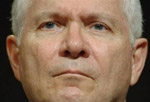 AFP: US Defense Secretary Robert Gates said on Saturday that Bahrain’s leaders needed to move quickly to adopt major reforms or else risk interference from Iran.
AFP: US Defense Secretary Robert Gates said on Saturday that Bahrain’s leaders needed to move quickly to adopt major reforms or else risk interference from Iran.
By Dan De Luce
 ABOARD A US MILITARY AIRCRAFT (AFP) — US Defense Secretary Robert Gates said on Saturday that Bahrain’s leaders needed to move quickly to adopt major reforms or else risk interference from Iran.
ABOARD A US MILITARY AIRCRAFT (AFP) — US Defense Secretary Robert Gates said on Saturday that Bahrain’s leaders needed to move quickly to adopt major reforms or else risk interference from Iran.
After talks with Bahrain’s king and crown prince, Gates said he was hopeful the government would take “far-reaching steps” but warned that countries across the region could no longer ignore popular demands for democracy.
Although there were no signs Shiite-led Iran was behind unrest in the Gulf kingdom or elsewhere in the region, Tehran would likely work to meddle in Bahrain’s politics amid sectarian tensions, Gates told reporters on his plane after a visit to Manama.
“I expressed the view that we had no evidence that suggested that Iran started any of these popular revolutions or demonstrations across the region,” said Gates, recounting his talks with the country’s king and crown prince.
“But there is clear evidence that as the process is protracted, particularly in Bahrain, the Iranians are looking for ways to exploit it and create problems,” Gates said.
“So I told them, in this instance, time is not our friend.”
Bahrain, a Shiite-majority state ruled by a Sunni dynasty, has been gripped by protests calling for political change since February 14.
The US defence chief, who arrived Friday evening in Bahrain amid rising tensions, said he came away encouraged that the country’s leaders king were prepared to accommodate anti-government protesters.
But Gates said he warned them that minor changes would not be enough.
“And I also said that under the circumstances and with the impulse behind the political and economic grievances across the region, that baby steps probably would not be sufficient… that real reform would be necessary.”
With unrest sweeping the Middle East and North Africa, the United States has struggled to balance its longstanding ties with Arab regimes with support for protests demanding democratic reform.
Gates said that Arab governments needed to recognise the scale of the change shaking their countries.
“I told both the king and the crown prince that across the region I did not believe there could be a return to the status quo ante,” he said. “That there was change, and it could be led or it could be imposed.”
“And obviously leading the reform and being responsive is the way we’d like to see this move forward,” he said.
Gates also said the unrest in Bahrain posed no immediate threat to US interests in Bahrain.
The US military relies on Arab regimes for access to airfields and ports across the Gulf, with the Navy’s strategic Fifth Fleet headquarters based in Manama.
While playing down Iran’s role in recent protests, Washington suspects Tehran has tried to persuade Shiite opposition groups in Bahrain to boycott any talks with the Gulf kingdom’s leadership, a US defense official, who spoke on condition of anonymity, told reporters.
Earlier Crown Prince Salman bin Hamad al-Khalifa, speaking to reporters in Manama after his talks with Gates, said he supported holding a referendum once a dialogue with opposition groups produces an agreement.
“When we agree, we will put it to another referendum. The people of Bahrain in one vote will be the final arbiters if there is agreement on a deal or not,” said the crown prince, according to a television pool report.
He said he was optimistic that opposition groups would participate in a dialogue with the government.
“I’m hopeful that they will join the dialogue without preconditions. We have given them the best deal they can hope for,” he said.
Gates, the first member of President Barack Obama’s cabinet to travel to Bahrain since demonstrations erupted in February, said he hoped opposition groups would agree to a dialogue with the government.
He said the government was in a difficult position, suggesting other Sunni regimes in the region were anxious about possible concessions to the country’s Shiite community.
“I think the government to a certain extent is between a rock and a hard place. There is a very large Sunni constituency in Bahrain and obviously their neighbors are watching very closely,” he said.
The Manama protests have set off alarm bells in neighbouring Saudi Arabia, which has a restive Shiite minority population. Riyadh launched a massive security operation Friday to deter protesters from a planned “Day of Rage.”


